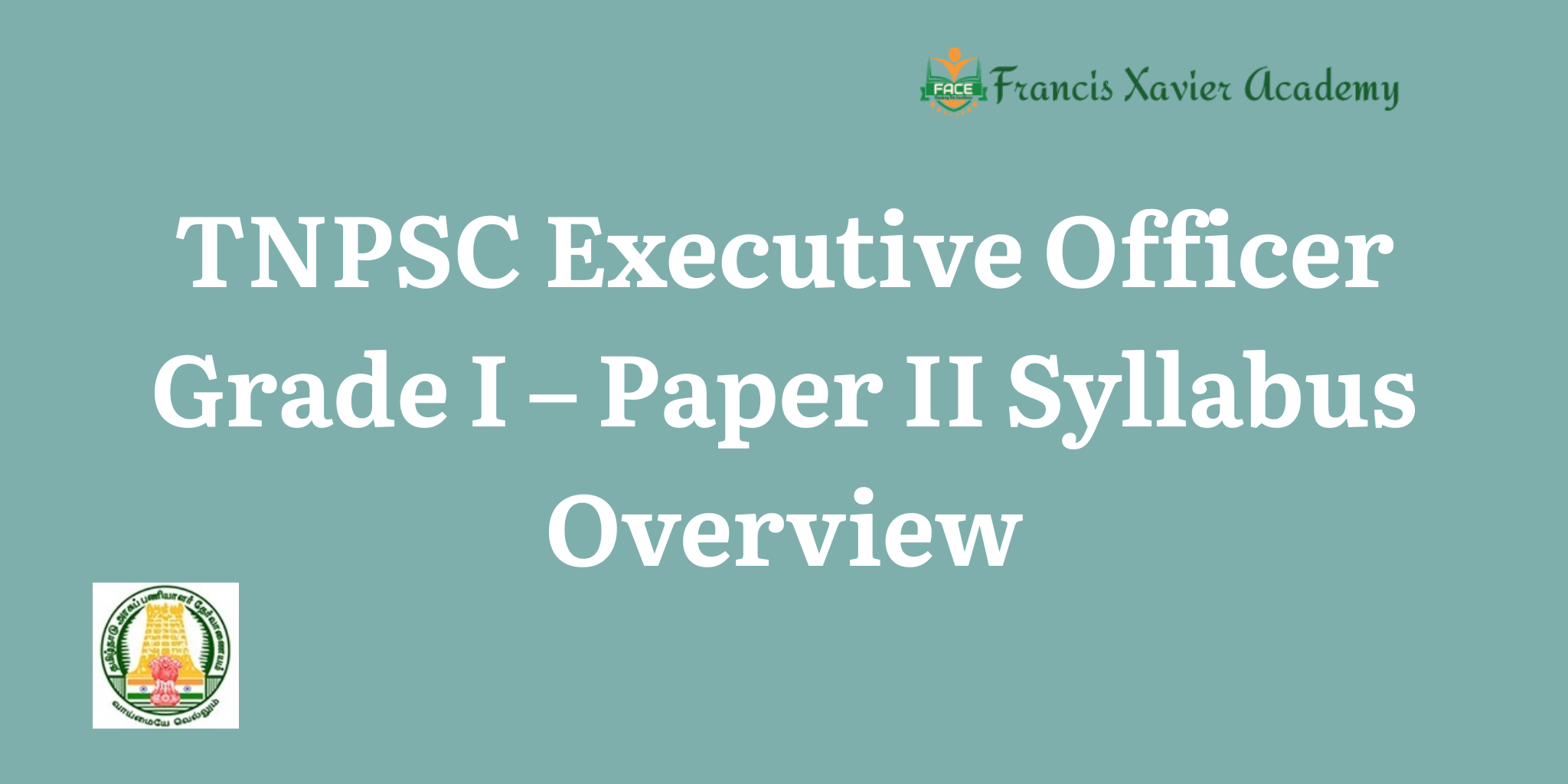
If you’re preparing for the TNPSC Executive Officer Grade I examination, understanding the TNPSC Executive Officer Grade I – Paper II Syllabus is essential for your success. Paper II focuses on topics ranging from Hindu religious literature, temple traditions, philosophical systems, and temple administration to the legal and administrative framework under the Hindu Religious and Charitable Endowments Act. This blog provides a clear unit-wise breakdown of the syllabus to help you plan your preparation effectively.
Let’s break down the syllabus unit-wise for better clarity:
UNIT I: Hinduism and Sacred Text
This unit focuses on the roots of Hinduism, tracing its origin and development. It covers:
- The Vedas, Upanishads, and Bhagavad Gita
- Hindu Epics, Puranas, Agamas
- Devotional literature like 4000 Divya Prabandham, Thevaram, Thiruvasagam, Thirumanthiram, and Periyapuranam
UNIT II: Branches of Hinduism
Understand the different sects within Hinduism:
- Saivism
- Vaishnavism
- Saktam
- Kaumaram
- Ganapatyam
- Sauram
These reflect the diverse theological perspectives within Hindu practice.
UNIT III: Saints, Sages, and Reformers
This unit introduces the religious leaders and their philosophies:
- Alwars and Nayanmars
- Ramalinga Swamigal, Sankara, Ramanuja, Madhva
- Modern reform movements like Ramakrishna Mission, and spiritual leaders like Sri Aurobindo, Ramana Maharishi
- Tamil saints like Siddhars, Pattinathar, and Thayumanavar
UNIT IV: Hindu Philosophy and Ethics
Dive into classical Indian philosophies and ethics:
- Orthodox schools: Nyaya, Vaisesika, Samkhya, Yoga, Mimamsa, Vedanta
- Saiva Siddhanta
- Heterodox systems: Basic concepts of Jainism
- Professional ethics for temple administrators, temple maintenance, and public relations
UNIT V: Hindu Culture and Temples
A look into the rich cultural heritage of temples:
- Temple Architecture, Sculpture, and Icons
- Arts related to temples: Music, Dance, Drama, and Discourses
- Temple elements: Sthala Vriksham, Sthala Puranas, Temple Ponds, Special Sannathis
- Temple worship practices, Poojas, Festivals, and customs
UNIT VI: Preliminary – Controlling Authorities
Focuses on legal and administrative provisions of the HR&CE Act:
- Definitions and extent of the Act
- Advisory and District Committees
- Roles and powers of the Commissioner and Controlling Authorities
UNIT VII: Governance of Religious Institutions
Learn about:
- Powers and duties of the Commissioner
- Entry rights into religious institutions
- Trustee qualifications, appointment, term, and removal procedures
UNIT VIII: Management of Property
Covers:
- Preparation of registers and property records
- Thittam, alienation of trust property
- Handling surplus funds, eviction processes, penalties, and appeals
UNIT IX: Executive Officers and Staff
This section deals with:
- Appointment and duties of Executive Officers
- Recruitment and punishment of office holders and servants in temples
UNIT X: Audit, Finance, and Legal Framework
Essential for transparency and governance:
- Temple budgets, audits, and financial reporting
- Contribution and audit fees, legal fee, common good fund
- Powers of inspection, government interventions, and rule-making authority
Final Thoughts
The TNPSC Executive Officer Grade I – Paper II syllabus is a unique blend of spiritual, cultural, administrative, and legal topics. It tests not only your knowledge of Hindu traditions and temple systems but also your understanding of governance under the HR&CE Act. A thorough study of each unit will help aspirants develop a strong foundation for becoming a responsible Executive Officer.
Prepare well and serve the heritage!
 Now
Now